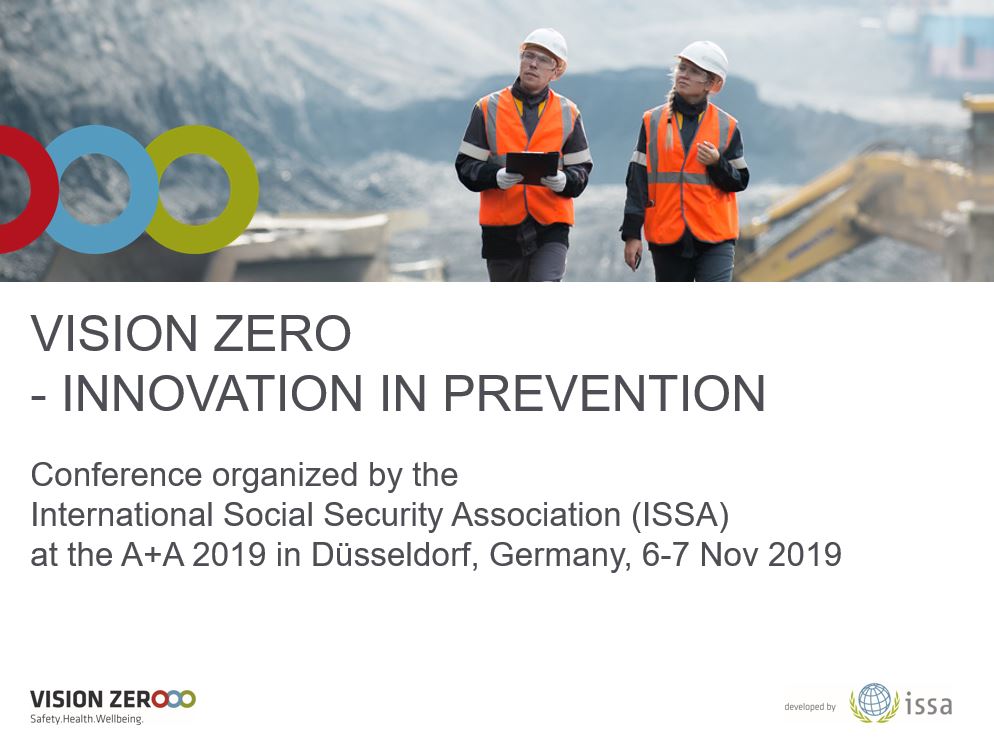The recent Vision Zero – Innovation in Prevention Conference, organized by the International Social Security Association (ISSA) at the A+A 2019 in Düsseldorf, Germany, looked at how globalization, digitalization and demographic changes are profoundly changing the world of work, and how occupational safety and health (OSH) has to adapt.
Traditional OSH approaches and tools are becoming less adapt to dealing with new work processes and structures emerging in the wake of digital transformation. This calls for new prevention strategies, and the Vision Zero campaign and its 7 Golden Rules offer flexible and effective pathways towards safety, health and well-being at work. In his opening statement, the ISSA President, Professor Joachim Breuer, reiterated the Vision Zero belief that all workplace accidents can be prevented with the right efforts, measures and mindset.
Putting Vision Zero into practice
The Conference provided not only an overview of the challenges and available tools, but also practical and successful examples from companies and organizations that are front-runners in putting Vision Zero into practice. Lars Hoffmann of Siemens emphasized the importance of cooperation, joint efforts and developing a new mindset in driving Vision Zero forward. Another company example came from Christopher Venables from Tesco, who demonstrated how, based on a maturity model, Tesco was implementing Vision Zero in eight Asian and European countries, notably India, Malaysia, Thailand, Czechia, Ireland, Poland, Slovakia and the United Kingdom. Vision Technologies from Pakistan documented how it changed its company culture by using the 7 golden rules, conducting risk assessments of its production process, and running workshops with all of its employees, and defining new safety rules.
The ISSA Special Commission on Prevention plays an important role in promoting Vision Zero globally, and its Chair, Martina Hesse-Spötter, shared her perspectives and the work of the Commission in a round-table session. In addition, Helmut Ehnes, Secretary General of the ISSA Prevention Section for the Mining Industry talked about the important issue of Vision Zero training. To date, over 900 occupational safety and health trainers have joined Vision Zero. Another important contribution was the presentation by Dr Mohamed Azman bin Aziz Mohammed, CEO of the Social Security Organization, Malaysia. Malaysia is a pioneer in developing and implementing a national Vision Zero strategy, and it has previously implemented a very successful Vision Zero project on combating commuting accidents.
Promoting Vision Zero internationally
Other international organizations played an important role in demonstrating the value of Vision Zero in promoting safety, health and well-being internationally. Dr Ivan Ivanov of the World Health Organisation presented international perspectives on healthy workplaces, while Yuka Ujita of the International Labour Organization made the link to work migration, and Tim Tregenza of the European Agency for Safety and Health at Work presented the European efforts to tackle the issue of dangerous substances in workplaces.
Finally, Ansar Majeed Khan Niazi, Minister of Labour and Human Resource, Punjab, Pakistan, was announced as new Vision Zero Ambassador during the Conference. In a video message addressing the Conference, the Minister emphasized that “The Labour and Human Resource Department of Punjab is highly committed to implement Vision Zero and establish a culture of prevention.”The Conference highlighted how Vision Zero supporters from all over the world have started to implement the 7 Golden Rules at national level and how they have developed their own prevention strategies and policies around Vision Zero. It also underlined how the 7 Golden Rules can be used in any company context, be it a multi-national enterprise or small and medium- businesses.




